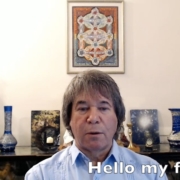The Offering Beyond Space and Time
A teaching by the Sfat Emet, with commentary by Rabbi Mark Asher Goodman. Cross-posted to Gashmius magazine.
Exodus 12:2
הַחֹדֶשׁ הַזֶּה לָכֶם רֹאשׁ חֳדָשִׁים רִאשׁוֹן הוּא לָכֶם לְחדְשֵׁי הַשָּׁנָה׃
This month shall mark for you the beginning of the months; it shall be the first of the months of the year for you.
Sfat Emet, Rabbi Yehuda Aryeh Lieb Alter of Ger (d. 1905)

Regarding the mitzvah of the Pesach sacrifice, it is preceded by “And this month shall be for you” (Exodus 12:2). For circumcision and the Pesach are the two most important commandments, that (transgressing them) they has the punishment of karet [being ‘cut off’]. These are the first mitzvot in the Torah. Milah is a sign on one’s body that the foreskin was removed. Thus the body is improved, to be a vessel to accept kedusha – holiness, departing from the confines of nature. As it is written “who ascends from us to heaven” – Mi Ya’aleh Lanu Hashamaimah – M.Y.L.H. So too, one bringing the Pesach offering must be circumcised – that the physical nature (gashmius) of the universe is subordinate to time. In the exodus from Egypt, the Israelites left their obligations to stars and the skies, according to the Zohar. Thus we learn ‘there are no signs for Israel.’ (Shabbat 156a) |
 The reason is that the children of Israel precede the universe, as the Torah says “Bereshit” (Genesis 1:1) “B’ – reshit” – Because of my first. As (Rashi, and Midrash cites) in Jeremiah 2:3 “Israel is the first – reshit – of my produce”. And thus they transcend time and space And Pesach is the beginning of the year for the three festivals. And one brings the korban pesach – the Pascal sacrifice – on the 14th. And the removal of leaven (shabbatot hase’or) is a [kind of] removal of the foreskin so that we be at the time in which we are able to elevate higher. It is like a going out of Egypt of the soul. So too it is with time. And thus we begin with ‘This month shall be for you.’ It is Israel that sanctifies time.
… — Sfat Emet, Rabbi Yehuda Aryeh Lieb Alter of Ger (d. 1905) Translation by Rabbi Mark Asher Goodman |
The push-pull of the life of a person that thinks about the divine and the eternal and the greater universe is the juxtaposition of the desire to transcend the physical world of gashmiut – physicality, corporeality – and the reality that we actually live in the physical world. Sure, you might want to spend every waking moment meditating and studying and escaping the earthly bonds of that which is material. But, also, a dude’s gotta eat. The kids need to be picked up from school. Someone must unclog the toilet.
(Editorial note: this essay was literally interrupted at this point so that I could cook gnocchi for my 12-year old before I leave for evening minyan.)
That spiritual world, ruchaniut in the parlance of the Hassidim, intersects with the physical at many times and in many ways in the attempt to bring holiness – kedusha – to the mundane. And there are two mitzvot – commandments (some Hassidim call them ‘connectors’) which meld the physical and spiritual. They also cross over and contain connections and parallels one to another. Those mitzvot are the korban pesach, the passover offering brought at the Temple in Jerusalem, and brit milah, the commandment of circumcision.
The first thing our commentator, the Sfat Emet (“Language of Truth”), Rabbi Yehuda Aryeh Leib Alter, the third Gerrer rebbe, notesת is that these two mitzvot both carry the punishment of karet – being excluded from the community (or, some rabbis say, the world to come) for the failure to perform them. Also, they are two of the first mitzvot in chronological order – milah is the second commandment and the pesach is the fifth commandment. Additionally, the two commandments overlap at some point, as there is an obligation to be circumcised in order to eat the pesach, according to Exodus 12:48.
I might also add that brit milah and the korban pesach are all past tense, inaccessible mitzvot. We can’t even do the korban pesach today, because there is no Temple. And brit milah is almost equally inaccessible. It technically isn’t even our mitzvah – it is an obligation of our parents upon us. And it happened at a time before we could ever possibly remember that it occurred. The mark on our flesh reminds us, just as the Western Wall reminds us there was a Temple, or a mitzvah that once was, but which we had no knowledge of at all. All that remains of each of these mitzvot is a scar where a thing once was.
But for the Sfat Emet, these are all just neat technical details that will allow him to explore his grander ideas.
For one, Rabbi Yehuda Aryeh Lieb seems to understand that both commandments go against what otherwise would have been the natural order of the physical universe. Man is born with a foreskin on his penis. This is, to the Jewish way of thinking, imperfect. It requires correction – a tikkun. Nature makes us one way, but in order to align with God’s ideal spiritual state, we modify that which God gave us. As the Gerrer teaches, “Thus the body is improved, to be a vessel to accept kedusha – holiness – departing from the confines of nature.”
The pesach is also like this: for the origin of the sacrifice is in the paschal lamb that was slaughtered in order to paint its blood on the two lintels of the houses of the Israelites, so that the angel of death would not kill the firstborn Israelites alongside the firstborn of the Egyptians. In other words, if the Hebrews had not taken an action to defy the normally proceeding manner of things, they would have died. Again, a correction was required. In both cases, in order to sanctify something, a physical alteration to the normal state of affairs was necessary.
Just as we begin to think everything in this text makes total sense, the Gerrer rebbe adds (almost literally) a third dimension to this text: he throws out the concept of time versus space. Because the commandment to bring the pesach starts a few lines earlier in the Torah with the very invention of the Hebrew calendar – Nissan is the first month, and the pesach is only brought on the 14th of the month. And if you aren’t physically capable of bringing the offering – if you are uncircumcised, or as the Torah teaches in Numbers 9:9-13, if you are ritually impure, or if you simply didn’t get there on time – too bad. Time waits for no one. No korban pesach for you.
The Sfat Emet slips that little bit of mindblowing profundity – “The physical nature (gashmius) of the universe is subordinate to time” – and then just moves right along. It doesn’t matter if the brisket is perfect and you studied the haggadah and you said the four questions with perfect kavannah – spiritual intention. If you missed doing it on the night that begins the 15th of Nissan, it doesn’t matter. (Well, actually, you can do it on the 16th at the second seder, and you get a mulligan to do it the 14th of Iyyar on Pesach Sheni, but still. There’s only so many do-overs in the cosmos.)
So time transcends space. But the Israelites transcend both – by way of a wild midrash that Rashi (Rabbi Shlomo Yitzhaki, 12th c.) happens to bring on the very first verse of the Torah. The word reshit means first. What is in the reshit – what was there at the beginning? Using clever word play linking the word reshit to elsewhere in the Tanakh, Rashi tells us that before creation, in reshit, “The Before”, was both Torah and Israel. God transcends time and space. Torah transcends time and space. And the Israelites transcend time and space.
Rav Yehuda Leib concludes by drawing out a third element that is ‘removal in the act of correction’, and that is the cleaning of leaven from our homes. That which is natural and normal becomes, for a time, unacceptable. We must intervene in space, at a given time, to remove a thing in order to align ourselves to holiness. Remove the foreskin. Remove the leaven. Remove (ok, sacrifice) the lamb. The correction creates elevation.
The elevation returns us to the primordial state before creation and before time. It returns Israel to bereshit – before the beginning, when we were alone with God and Torah. Beyond time and space. Before we were bogged down by things like a calendar that began on such and such a date; and before we had physical obligations like making the kids dinner.

Rabbi Mark Asher Goodman is a rabbi, writer, and devotee of Hassidic texts. He serves at two shuls in Western Pennsylvania. His forthcoming book, Life Lessons from Recently Dead Rabbis: Hassidut for the People, is coming soon from Bayit, and is a down-to-earth companion to 54 Hassidic texts, most of which have never before been translated into English. His ideal dinner guests would include Rabbi Levi Yitzhak of Berdichev, Rabbi Nosson Tzvi Finkel, the Alter of Slabodka, the RZA and Raekwon from Wu Tang Clan, and hip-hop genius Talib Kweli. We’d eat chicken strips and french fries.








